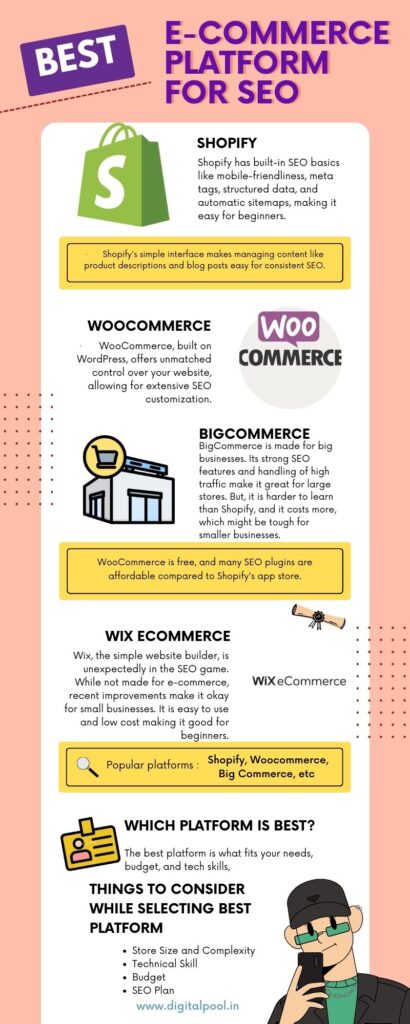We all know that in SEO every click matters. So, SEO is your reliable tool. But to use it well, you need the best platform and a strong digital place with good SEO tools and flexibility to do well on search engines. So, the big question is: “Which e-commerce platform is the best for SEO?”

Is Shopify more SEO-friendly than Woocommerce?
Both Shopify and WooCommerce have good features for SEO, but it is not a simple choice. Let us look at the strengths and weaknesses of each:
Shopify
Strengths:
- SEO Features: Shopify has built-in SEO basics like mobile-friendliness, meta tags, structured data, and automatic sitemaps, making it easy for beginners.
- Speed and Security: Shopify’s hosted platform is fast and secure, important for E-commerce SEO and user experience.
- App Store: Shopify’s app store has many SEO-specific apps, allowing targeted optimization.
- Easy Content Management: Shopify’s simple interface makes managing content like product descriptions and blog posts easy for consistent SEO.
Weaknesses:
- Limited Control: Shopify’s closed platform limits control over core website elements, hindering advanced SEO strategies.
- Costly Plugins: Powerful SEO plugins on the app store can be expensive, increasing overall costs.
- Content Limitations: While content creation is easy, Shopify’s built-in blogging lacks flexibility compared to WordPress.
WooCommerce
Strengths:
- Flexibility: WooCommerce, built on WordPress, offers unmatched control over your website, allowing for extensive SEO customization.
- Open-source: WooCommerce’s open-source nature allows limitless plugin integration and customization, providing a vast array of SEO tools.
- Content Powerhouse: WordPress’s content management capabilities, with advanced plugins like Yoast SEO, support effective content-driven SEO.
- Cost-Effective: WooCommerce is free, and many SEO plugins are affordable compared to Shopify’s app store.
Weaknesses:
- Technical Skill Required: WooCommerce’s flexibility demands technical knowledge or developer access for optimal SEO setup.
- Security Concerns: WordPress requires vigilant security maintenance due to its open-source nature.
- Performance Tuning: WooCommerce generally requires more optimization compared to Shopify’s hosted platform.
Which one to Choose?
- Shopify: Choose if you are a beginner looking for a user-friendly platform with built-in SEO features, fast loading times, and app-powered optimization.
- WooCommerce: Opt for if you value ultimate customization, plugin flexibility, extensive content capabilities, and cost-effectiveness, even if it demands some technical know-how.
Let us discuss other platforms as well,
WooCommerce (WordPress)
WordPress, the well-known system for managing content, brings its tested SEO skills to WooCommerce. This open-source tool lets you change everything on your online store for better visibility on search engines. Plugins like Yoast SEO and Rank Math help with on-page work and technical SEO. But, you need to manage updates and security, which might need some tech knowledge.
Shopify
Shopify, the smooth and user-friendly option, is good for beginners. Its built-in SEO features cover basics like meta descriptions and mobile-friendliness, helping you start your SEO quickly. The app store has more tools for SEO, like keyword research and link building. But remember, while it is easy, it does not let you customize as much as WooCommerce, and some advanced SEO might need other tools.
BigCommerce
BigCommerce is made for big businesses. Its strong SEO features and handling of high traffic make it great for large stores. But, it is harder to learn than Shopify, and it costs more, which might be tough for smaller businesses.
Wix eCommerce
Wix, the simple website builder, is unexpectedly in the SEO game. While not made for e-commerce, recent improvements make it okay for small businesses. It is easy to use and low cost making it good for beginners. However it is not as customizable as other platforms, and its SEO is not as strong.
Which platform is best?
The best platform is what fits your needs, budget, and tech skills,
- Store Size and Complexity: Small stores need flexibility, while big ones need to handle a lot. Choose a platform that grows with you.
- Technical Skill: Do you like customizing or want it easy? Think about how comfortable you are with tech stuff.
- Budget: Some platforms cost less, and others offer more but cost more. Plan your budget.
- SEO Plan: Are you new or experienced with SEO? Choose a platform that matches your skills and goals.
Choosing the right e-commerce platform is just the start. The real challenge is always making your website better, creating useful content, and getting high-quality backlinks. Use your platform’s tools, look at data, and change your plan to stay ahead of search engines.
Now, with knowledge and a plan, you can pick the e-commerce platform that helps your SEO. Remember, there is no one solution, it is about understanding your needs, using your platform well, and always getting better at SEO.
